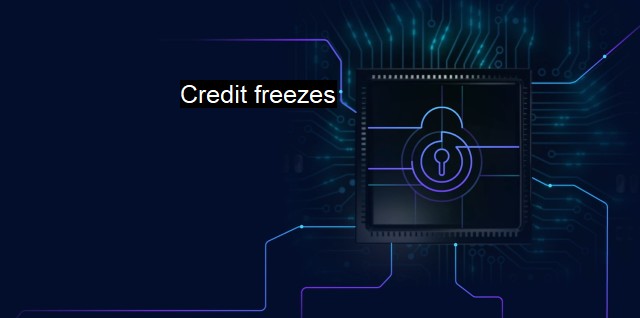What are Credit freezes?
Empowering Consumers: The Key Role of Credit Freezes in Protecting Against Cybercrime and Identity Theft
Credit freezes, also known as security freezes, have become indispensable tools in the modern cybersecurity landscape, particularly following the surge of identity theft and fraud cases. These involve restricting third-party access to an individual's credit report, which lenders often require before approving loan applications or credit cards. Restricting access can prevent criminals from opening accounts under your name, as most creditors typically inspect your credit history before undertaking business with you.Cybercrimes have evolved significantly over the years, taking somewhat profound, complex turns. Among the most sophisticated cyber-attacks, include identity theft, a systematic, deceptive crime involving unauthorized use of another person's identifying information, often for financial gain. Identity theft has become noticeably prevalent today, fueled by the internet's inherently seamless, vast, intricate network and the rise of digital lifestyles. It is seen as the foundation of countless unauthorized transactions.
In this context, a credit freeze serves as an antivirus measure combating this financial fraud. While antivirus software fends off malicious software and infiltration, a credit freeze serves as a cybersecurity measure tackling identity theft. It stems from the concept that making personal credit reports inaccessible can guard against fraudulent account openings.
Consequently, credit freezes have been depicted as essential antivirus-like tools, becoming formidable weapons in the fight against identity theft and other, similar crimes involving credit reports and financial fraud. A credit freeze can help maintain the integrity of your private information, giving you an element of control over who sees your information or even when it may be seen.
When a credit freeze is enacted, the individual often locks their credit file at each of the major credit bureaus by creating a PIN. If anyone tries to access their credit reports to open up a new account, they cannot view the information without this special code, thus achieving a solid level of security.
Just like antivirus software, a credit freeze isn't an absolutely failsafe shield against all financial fraud. Indeed, it focuses on preventing new account identity theft where criminals open new accounts under your name. It does not safeguard against account takeover, where your current financial accounts could be hijacked, or medical identity theft.
The essence of credit freezes has redefined cybersecurity to a significant extent. For one, they become critical defenses, offering the most effective known method for preventing someone else from opening a credit account under your name. Reflectively, establishing these freezes with the major agencies marks a quite proactive, advantageous financial decision, synonymous with installing antivirus systems in a computer to fight data compromising viruses.
Credit freezes have drawn much attention for alliances with other identity protection tools, often the multidimensional layers of protection. Just as most technology experts recommend a versatile, layered approach to defend against viruses and other cyber threats, credit freezes often work in concert with other security measures, including credit monitoring, identity theft protection, and fraud alerts.
Importantly, credit freezes offer individual control over their credit files. You can also selectively lift the freeze when needed, say, if you’re applying for a job or loan that needs access to your credit data. As a result, credit freezes achieve an optimum balance between allowing legitimate credit inquiries and curbing fraudulent applications.
Credit freezes also eliminate the worry of repetitive threats that can come from recurring virus attacks. Being a non-expiring protection, credit freezes do not need renewal. Such long-term protection parallels the real-time protection enabled by most antivirus software against persistent malware.
a credit freeze functions similarly to antivirus software, stonewalling attempts at unaccounted access and penetration. While the two represent different areas they both have a similar objective of protecting personal data from unauthorized accesses and manipulations. Despite their limitations, their effectiveness cannot be gainsaid, underscoring how treatable both identity theft and cybersecurity threats are when armed with the right tools. Therefore, cybersecurity awareness and proactivity should go beyond having secure passwords and installing antivirus software. It should encompass more stringent measures like credit freezes in blotting out the increasing threats of financial fraud. After all, with the surge in online transactions and the increasing dominance of digital platforms, the importance of protecting personal information will only continue to climb.

Credit freezes FAQs
What is a credit freeze?
A credit freeze is a security measure that restricts access to your credit report. It prevents unauthorized people from opening new lines of credit or loans in your name.Why would I want to freeze my credit?
Freezing your credit can help protect you against identity theft. If someone were to steal your personal information, they wouldn't be able to use it to open new accounts.How do I freeze my credit?
You can freeze your credit by contacting each of the three major credit bureaus: Equifax, Experian, and TransUnion. You can do it online, by phone, or by mail.How do I unfreeze my credit?
You can unfreeze your credit by contacting the credit bureaus again and requesting that the freeze be lifted. You'll need to provide your PIN or password, which you created when you first froze your credit. The unfreeze process can take several days to complete.| | A | | | B | | | C | | | D | | | E | | | F | | | G | | | H | | | I | | | J | | | K | | | L | | | M | |
| | N | | | O | | | P | | | Q | | | R | | | S | | | T | | | U | | | V | | | W | | | X | | | Y | | | Z | |
| | 1 | | | 2 | | | 3 | | | 4 | | | 7 | | | 8 | | |||||||